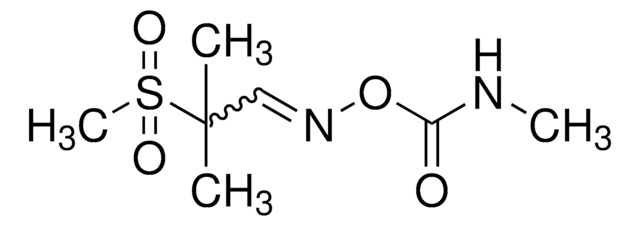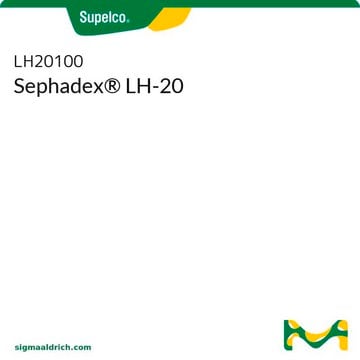31258
Aldicarb-sulfoxide
PESTANAL®, analytical standard
About This Item
Produits recommandés
Qualité
analytical standard
Niveau de qualité
Gamme de produits
PESTANAL®
Durée de conservation
limited shelf life, expiry date on the label
Technique(s)
HPLC: suitable
gas chromatography (GC): suitable
Application(s)
agriculture
environmental
Format
neat
Température de stockage
2-8°C
Chaîne SMILES
CNC(ON=CC(C)(C)S(C)=O)=O
InChI
1S/C7H14N2O3S/c1-7(2,13(4)11)5-9-12-6(10)8-3/h5H,1-4H3,(H,8,10)
Clé InChI
BXPMAGSOWXBZHS-UHFFFAOYSA-N
Vous recherchez des produits similaires ? Visite Guide de comparaison des produits
Description générale
Application
- Fruits and vegetable using solid-phase extraction followed by liquid chromatography-atmospheric pressure chemical ionization mass spectrometry.
- Water samples by gas chromatography/mass spectrometry (GC-MS) using short capillary columns.
- Foodstuffs by liquid chromatography-tandem mass spectrometry (LC-MS/MS) using a triple quadrupole analyzer.
Informations légales
Mention d'avertissement
Danger
Mentions de danger
Conseils de prudence
Classification des risques
Acute Tox. 1 Oral - Aquatic Acute 1
Code de la classe de stockage
6.1A - Combustible acute toxic Cat. 1 and 2 / very toxic hazardous materials
Classe de danger pour l'eau (WGK)
WGK 3
Point d'éclair (°F)
Not applicable
Point d'éclair (°C)
Not applicable
Équipement de protection individuelle
Eyeshields, Faceshields, Gloves, type P2 (EN 143) respirator cartridges
Faites votre choix parmi les versions les plus récentes :
Déjà en possession de ce produit ?
Retrouvez la documentation relative aux produits que vous avez récemment achetés dans la Bibliothèque de documents.
Les clients ont également consulté
Notre équipe de scientifiques dispose d'une expérience dans tous les secteurs de la recherche, notamment en sciences de la vie, science des matériaux, synthèse chimique, chromatographie, analyse et dans de nombreux autres domaines..
Contacter notre Service technique















